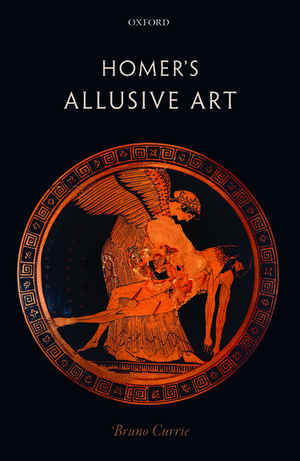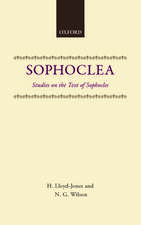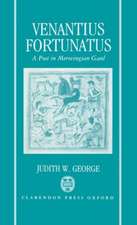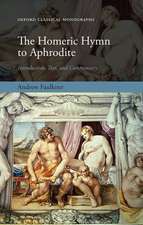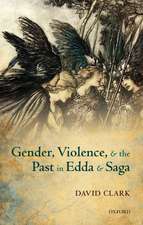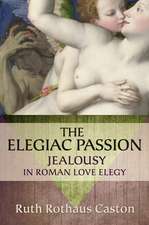Homer's Allusive Art
Autor Bruno Currieen Limba Engleză Hardback – 13 oct 2016
Preț: 688.53 lei
Preț vechi: 987.16 lei
-30% Nou
Puncte Express: 1033
Preț estimativ în valută:
131.75€ • 137.56$ • 109.04£
131.75€ • 137.56$ • 109.04£
Carte tipărită la comandă
Livrare economică 25-31 martie
Preluare comenzi: 021 569.72.76
Specificații
ISBN-13: 9780198768821
ISBN-10: 0198768826
Pagini: 358
Dimensiuni: 164 x 240 x 25 mm
Greutate: 0.66 kg
Editura: OUP OXFORD
Colecția OUP Oxford
Locul publicării:Oxford, United Kingdom
ISBN-10: 0198768826
Pagini: 358
Dimensiuni: 164 x 240 x 25 mm
Greutate: 0.66 kg
Editura: OUP OXFORD
Colecția OUP Oxford
Locul publicării:Oxford, United Kingdom
Recenzii
Currie argues his case insistently and consistently, while at the same time being explicit throughout about the hypothetical nature of much of what he proposes One does notneed to share Currie's conception of allusion in order to benefit from a book which isso full of interesting material - both Greek and Near Eastern - and bristles withso many sharp observations, striking comparisons, and thought-provoking reflections.
This is a book to be enjoyed slowly and thoughtfully -- it is unusually user-friendly in its system of cross-referencing and in its overall readability, packed full of information and full supporting secondary and primary sources but always keeping the wood visible above the trees. The death of Martin West had left a gaping hole in this area of study -- I think that MLW now has a worthy successor to his crown.
Bruno Currie's book delves into this most significant debate in a systematic and thoughtful manner. It represents a major contribution and indispensable reading for all those interested in Homer and archaic Greek poetry at large ... a rewarding and thought-provoking book. Currie is commended for his sound methodology, his step-by-step unravelling of his thought as he directs his reader with admirable precision and help through labyrinthine turns of arguments difficult to grasp: a true sine qua non for all scholars interested in early Greek hexameter poetry.
This is a book to be enjoyed slowly and thoughtfully -- it is unusually user-friendly in its system of cross-referencing and in its overall readability, packed full of information and full supporting secondary and primary sources but always keeping the wood visible above the trees. The death of Martin West had left a gaping hole in this area of study -- I think that MLW now has a worthy successor to his crown.
Bruno Currie's book delves into this most significant debate in a systematic and thoughtful manner. It represents a major contribution and indispensable reading for all those interested in Homer and archaic Greek poetry at large ... a rewarding and thought-provoking book. Currie is commended for his sound methodology, his step-by-step unravelling of his thought as he directs his reader with admirable precision and help through labyrinthine turns of arguments difficult to grasp: a true sine qua non for all scholars interested in early Greek hexameter poetry.
Notă biografică
Bruno Currie is Associate Professor in Classical Languages and Literature at the University of Oxford and Monro Fellow and Tutor in Classics at Oriel College. His chief research interests are ancient Greek poetry (especially epic and lyric), ancient Greek religion, and the interaction between the two, and he is the author of several articles on these subjects. His other publications include Epic Interactions: Perspectives on Homer, Virgil, and the Epic Tradition Presented to Jasper Griffin by Former Pupils (Oxford, 2006), as co-editor, and the authored monograph Pindar and the Cult of Heroes (Oxford, 2005).
